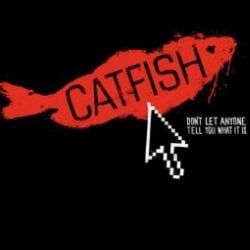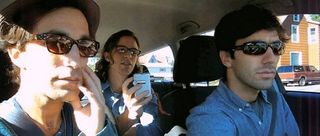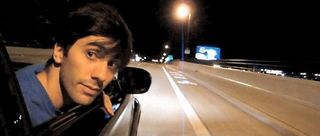Interview: Talking The Power And Pitfalls Of Facebook With The Catfish Guys

When I got the three main players of Catfish on the phone, I wasn't going to ask the guys if the story was real. It's a question that directors Ariel Schulman and Henry Joost, along with the documentary's "star" Nev Schulman, have been batting away ever since Sundance, when Catfish emerged to stunned rave reviews as well as a nagging sense that the entire story had unfolded in a way that was just too perfect for a documentary. Separately, they were also dealing with selling, and now promoting, a movie packed densely with spoilers; I know I relished the fact that I saw Catfish at Sundance not knowing a thing about it, and regret that, thanks to the realities of marketing a film, few people will have that chance when the movie opens wide September 17.
Here's what you need to know: Ariel, Henry and Nev (who is Ariel's brother) all share an office in New York and constantly film each other along with their actual artistic pursuits (Ariel and Henry are the filmmakers, Nev a photographer). A few years ago Nev struck up a pen pal friendship with an 8-year-old girl in Michigan, Abby, who painted a picture of a photo of Nev's that was published in the paper. Nev's letters with Abby led to Facebook, which led to a budding relationship with Abby's adult sister with Megan, which led to the three guys driving to Michigan to learn more about this fascinating family. The story twists and turns in a lot of directions, and ultimately forces the three guys-- and you, the audience-- to ask a lot of questions about the nature of online relationships and the purpose of sites like Facebook in general. Oh, and the movie is funny, entertaining, and at one point kind of turns into a thriller. Not your typical documentary by any stretch.
So when I talked to Ariel, Nev and Henry, I wanted their thoughts on Universal's marketing campaign for the film, which leans heavily on the thriller aspects of the film, and how their attitude toward Facebook and the Internet has changed since the film came out. Nev also chimed in to insist he's totally comfortable being the unintentional star of a big fall movie, and we also talked about how their movie might fit in alongside David Fincher's The Social Network-- as Henry put it, that movie represents the end of Facebook, while theirs depicts it at the peak of power. Check out everything they had to say below, and catch Catfish-- knowing as little about it as possible-- on September 17.

What's it been like for you guys working with Rogue to prepare to put this movie out there, and figure out how to sell it?
Ariel: What was cool was their initial feeling that the movie had a lot of potential, and that they weren't going to view it like an indie doc. They felt if marketed correctly they could get it out to a big audience, because it hit a wide nerve.
What kind of input did you guys have on figuring out the marketing?
Ariel: They were just like, you guys have got to trust us. This is a tough movie. There's a lot of themes here, and it's impossible to put them all in one trailer. If we say that it's a documentary, we're going to alienate a lot of potential audience members. I guess we've just kind of trusted them, focusing on the thriller aspect. If you think about the movie in three parts there's a buddy comedy, a suspense thriller and a human drama. I guess they figured by focusing on the thriller aspect they'd get more people in the seats. We were worried that might disappoint some people, but so far it hasn't.
CINEMABLEND NEWSLETTER
Your Daily Blend of Entertainment News
Had you thought about it as a thriller before then?
Henry: We felt like the second part of the film, or particularly a few scenes in the second act of the film, are very scary. Arriving at the barn, arriving at the house. Those were really, really scary moments in real life.
Have you talked to people who come away surprised but happy about it?
Henry:: Everybody who sees the film brings their own thing to it. Some walk away and say, you know what, that really is a horror movie. Which I don't necessarily agree with, but some people feel that way. In my opinion it's a lot of different movies in one.
How do you feel about this being your first big work that gets out there and gets seen by everyone, even though it's a very personal story you weren't really expecting to tell. Do you think it reflects what you want to be doing?
Henry:: I think it's the perfect first film for us to have out there. It really reflects our personal filmmaking styles more than our commercial work, or even the ballet film that we made. This is the way we would make a movie with absolutely no control from anyone else.
How do you think it represents your personal filmmaking style, because it feels so off the cuff?
Henry: Well that's the style. We're obsessed with using these small cameras and filming these strange moments i our life that other people might not be interested in. That's our passion for filmmaking.
Ariel: Spontaneity.
Henry: Yeah, and handmade.
Do you guys use Facebook now in a different way than you did before making this movie?
Henry: Yeah, we've become much more cautious about what we put online, and how we view what we see online. if you're meeting a new stranger or receiving a friend request, we don't have the same naivete we used to. Nev: I find my Facebook usage has changed a lot. I've almost completely stopped using my personal profile, and now I find that I really enjoy using the Catfish fanpage. Because it's sort of an anonymous way to interact with more people, strangely. They don't really know it's me. I get to watch them and tell them things, it's kind of fun. It's different. I have less invested personally.

But at the same time you've got this movie coming out, and people are going to see this and feel like we know you.
Nev: I'm totally kind of into it. In some way I am an exhibitionist. And for that reason I allow my brother to film me whenever he wants to. I'm just so happy that I get to share this crazy experience with people. I've had a lot of crazy things happen to me in my life because of my impulsive nature. This is kind of the first time that it's really paid off. Most of the time I just end up getting gin trouble, or getting hurt, kicked out of a school, something like that. This experience happened after a point in my life where I became a mature adult. This was my first adventure as a mature adult. As a result of being real and having this story told, I've now got a strangely bright new future. It's fun sharing my story with people and being popular.
Ariel: I love that our first big movie has us in it as characters. It feels less pretentious, I don't feel like a director as much trying hard to make a movie and not be in it.
Henry: Or pretend like the camera has no effect on a situation, or pretend like we don't have opinions or a role in this story. It just felt more honest.
With this movie and The Social Network coming out so close together, a lot of people are going to be looking at them to say something about our generation and what Facebook means. Are you comfortable standing for something that big?
Ariel: Yeah, this is the heartbeat of this generation. If you have a stethoscope, what you hear is an Internet connection. This is modern communication, this is modern identity. This is the way we're interacting. There's a lot of lessons to learn from Catfish and perhaps from The Social Network as well. I think we all need to take a step back and think about what we're portraying online.
Do you think a story like this could happen again? Are we getting too aware of the pitfalls here for people to have a relationship like this?
Ariel: The funny thing is, every day that we screen this or talk to journalist, we hear one or two or three stories of someone experiencing something nearly identical. And some of them are happening currently. Yeah, it could happen gain. You just need the luck of having two documentary filmmakers in your face for nine months of your life.
Henry: I think it's happening more and more, and there is a sort of breaking point that's happening soon. We are on the way to a critical mass. It's getting to the point where it can't sustain itself anymore. I feel it already, and a lot of people I know feel it too. This building negativity and disdain for the fact that we all kind of realize that the more time we invest online, the less we actually get in our real life. It just sort of breeds loneliness and lost time and less friendship. I would be cool with no more Facebook tomorrow. It'll be an interesting lesson learned, to see how it pans out over the next year or two.
Staff Writer at CinemaBlend
Most Popular





